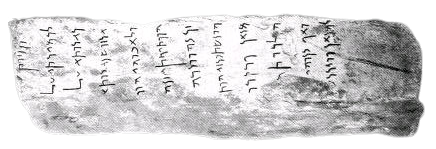During the reign of the Indian king Ashoka the Maurya Empire was vast.It stretched from Afghanistan and Pakistan ,covering almost all the Indian subcontinent and up to Bangladesh.
One of his edicts was a bilingual inscription in Greek and Aramaic carved in stone,dated 3rd century B.C.The inscription was discovered at Kandahar and is now lying in the National Museum of Afghanistan.
One of his edicts was a bilingual inscription in Greek and Aramaic carved in stone,dated 3rd century B.C.The inscription was discovered at Kandahar and is now lying in the National Museum of Afghanistan.
| Greek text |
|
| Aramaic text |
| שנן 10 פתיתו עביד זי מראן פרידארש מלכא קשיטא מהקשט |
| מן אדין זעיר מרעא לכלהם אנשן וכלהם אדושיא הובד |
| ובכל ארקא ראם שתי ואף זי זנה כמאכלא למראן מלכא זעיר |
| קטלן זנה למחזה כלהם אנשן אתהחסינן אזי נוניא אחדן |
| אלך אנשן פתיזבת כנם זי פרבסת הוין אלך אתהחסינן מן |
| פרבסתי והופתיסתי לאמוהי ולאבוהי ולמזישתיא אנסן |
| איך אסרהי חלקותא ולא איתי דינא לכלהם אנשיא חסין |
| זנה הותיר לכלהם אנשן ואוסף יהותר |
| Latin transcription |
| SHNN 10 PTITW EBID ZI MRAN PRIDARSH MLKA QSHIJA MHQSHJ |
| MN ADIN ZEIR MREA LKLHM ANSHN WKLHM ADWSHIA HWBD |
| WBKL ARQA RAM SHTI WAP ZI ZNH KMAKLA LMRAN MLKA ZEIR |
| QJLN ZNH LMXZH KLHM ANSHN ATHXSINN AZI NWNIA AXDN |
| ALK ANSHN PTIZBT KNM ZI PRBST HWIN ALK ATHXSINN MN |
| PRBSTI WHWPTISTI LAMWHI WLABWHI WLMZISHTIA ANSN |
| AIK ASRHI XLQWTA WLA AITI DINA LKLHM ANSHIA XSIN |
ZNH HWTIR LKLHM ANSHN WAWSP IHWTR |
| English text |
|

